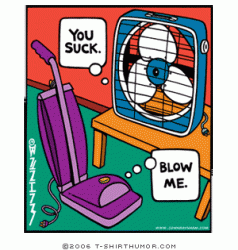Can someone comment if I can keep using a Dyson in the USA even though I bought it in Japan? There is a difference of 10 watt between the two countries.
Got a tip for us?
Let us know
Become a MacRumors Supporter for $50/year with no ads, ability to filter front page stories, and private forums.
Dyson vacuum machine
- Thread starter YS2003
- Start date
- Sort by reaction score
You are using an out of date browser. It may not display this or other websites correctly.
You should upgrade or use an alternative browser.
You should upgrade or use an alternative browser.
The problem is voltage does not match on its spec. I have a voltage regulator machine with which I can step down the US's 100V to the Japan-spec Dyson's 100V. I am not sure how well or effective a voltage regulator is. The frequency is okay for the both countries.If the voltage and frequency match up, then yes.
I assume you mean volt in which case yes, it'll be fine.
Not necessarily.
It may be 110V but at 50Hz, which wouldn't be a fire hazard, but since US power is 60Hz the vacuum will not run at the same speed.
If it is marked 100-240V 50/60Hz, then yes, it will work.
100V vs 110V
I got a reply back from Dyson USA about using a Japan-spec Dyson in the USA. They said they don't recommend using a 100V Japan spec Dyson D12 in a 110 V country such as the USA.
I am interested in the opinions or thoughts from people with the electronic engineering background. Is it really bad to plug 100 V electronics equipment (speakers, computer peripheries, and others) into a 110V power outlet? Does that cause a 100 V equipment get burned out under a 110 V environment?
Most of the electronics can deal with the frequency as they are speced for 50 to 60 hz. So, I am only concerned about the voltage issue.
I got a reply back from Dyson USA about using a Japan-spec Dyson in the USA. They said they don't recommend using a 100V Japan spec Dyson D12 in a 110 V country such as the USA.
I am interested in the opinions or thoughts from people with the electronic engineering background. Is it really bad to plug 100 V electronics equipment (speakers, computer peripheries, and others) into a 110V power outlet? Does that cause a 100 V equipment get burned out under a 110 V environment?
Most of the electronics can deal with the frequency as they are speced for 50 to 60 hz. So, I am only concerned about the voltage issue.
Well, none of these things are quite as powerful as a vacuum cleaner, but when I moved to the US from Japan I brought a rice cooker, a yakiniku hotplate, and some smaller electronic devices (camcorder, camera, etc) and they all ran fine on US current.
I have a couple of step-down transformers, quite heavy-duty. I never used them, though. If you need one, PM me.
I have a couple of step-down transformers, quite heavy-duty. I never used them, though. If you need one, PM me.
Well, none of these things are quite as powerful as a vacuum cleaner, but when I moved to the US from Japan I brought a rice cooker, a yakiniku hotplate, and some smaller electronic devices (camcorder, camera, etc) and they all ran fine on US current.
I have a couple of step-down transformers, quite heavy-duty. I never used them, though. If you need one, PM me.
Agreed, but motors are a little different. The frequency affects the RPM and power draw of the motor. Certain AC motors are easily rated for different frequencies (indeed, this is one of the easiest ways to create a variable-speed motor), but I wouldn't count on a vacuum having one of these.
I believe the power of the motor and/or the power of the vacuum may not be as strong as they were. Try it. You may not even notice such loss.
They don't recommend it because they don't want reliability. I don't know a lot about electric motors as I'm a components engineer, but I can't imagine that with the frequency being tolerable, a 10% higher voltage level would hurt the motor. You have to build those things with tolerances, because you can't be sure you're getting a pure 100 from your socket in Japan anyway.
Have you already tried it?
Have you already tried it?
Dyson's are totally worth the money...they make your carpet look brand new after you vacuum..YIKES!!
10Vs will do nothing to harm the vacuum. However if they recommend not using it, then there maybe a good reason, cheap parts, electronics that I don't know of.
Personally I think they don't recommend it because that means less money for them. I could be wrong though.
Personally I think they don't recommend it because that means less money for them. I could be wrong though.
Not necessarily.
It may be 110V but at 50Hz, which wouldn't be a fire hazard, but since US power is 60Hz the vacuum will not run at the same speed.
If it is marked 100-240V 50/60Hz, then yes, it will work.
Minus one fact. Electric motors run on DC power. The Vacuum already has a devices to change the power from AC to DC. The hz there is not going to matter.
Register on MacRumors! This sidebar will go away, and you'll see fewer ads.


